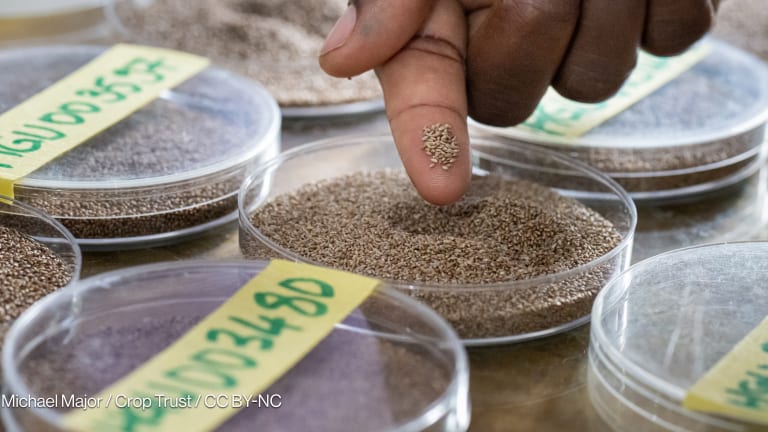Investing in smallholder farmers to feed the future
As the Committee on World Food Security meets this week in Rome, USAID's Tim Fella discusses how securing land rights for smallholder farmers is an essential part of creating the right enabling environment for agricultural investment — which in turn leads to sustainable food security. A guest opinion.
As the International Year of Family Farming winds down, a new set of United Nations principles recognizes that in order to promote global food security, we need to acknowledge and promote family farmers as key investors in agriculture and food systems. The U.N. Committee on World Food Security is meeting in Rome this week to endorse the Principles for Responsible Investment in Agriculture and Food Systems that pave the way for much-needed agricultural investments that will help feed the world’s expanding population, projected to be approximately 9 billion by 2050. The principles, together with the internationally recognized guidelines for land tenure, paint a picture of how we, as development practitioners, can encourage governments, civil society and the private sector — including family farmers — to collaborate to overcome persistent barriers to food security and poverty alleviation. Family farmers are often underserved investors. Just like other commercial entities, they need the right policies, laws and processes in place to encourage and expand their investments in food production. Importantly, the new set of principles addresses this need by encouraging governments to create an enabling environment that fosters responsible investment and protects the legitimate land rights of one of the most vulnerable groups of family farmers: smallholder farmers. Directly addressing the needs of smallholder farmers is essential because, as a recent report by the U.N. Environment Program’s World Conservation Monitoring Center and the International Fund for Agricultural Development tells us, over 80 percent of food consumed in low-income countries is produced by smallholder farmers. The report argues that smallholder farmers have the power to “transform the rural landscape and unleash a new and sustainable agricultural revolution.” And, as other research shows, given the right enabling environment, small farms can be as competitive as other agribusinesses. Securing legitimate land rights is one important way to protect smallholders and incentivize their land-based investments, including better agricultural inputs, soil and water conservation, and adoption of land use practices that may have a longer-term return on investment. Over the past five years, media reports and research have pointed to the harm smallholder farmers, pastoralists, and other food producers face when their legitimate land rights are involuntarily transferred, expropriated or reallocated. Such transfers are less likely to happen when secure land rights exist. Transparent and secure land rights are critical in enabling responsible and inclusive investment in agriculture, promoting efficient and productive land use, and spurring economic growth. This is especially true for women, who are 43 percent of the agricultural labor force in developing countries, who have more power in household decision-making and make investments that lead to better household nutrition when their rights to land are secure. The RAI encourages governments to take an important step and facilitate the responsible investments of all investors — public and private, large and small. One promising approach is for governments to recognize and protect the land rights of smallholder farmers — providing them with more security and certainty — while encouraging collaborative contracting between larger investors and smaller farmers. Outgrower and contract farming schemes that are coupled with efforts to secure land rights provide good models for more equitable agricultural development. Public-private partnerships allow for big companies as well as small and medium-sized enterprises to work with smallholder farmers, but they must be based on the recognition of legitimate land rights as highlighted in the new principles. Furthermore and according to the Fairtrade Foundation, investors can better engage farmers by establishing clear development goals, clarifying land tenure, engaging farmers in the design and development of PPPs, being transparent, and adopting the highest possible standards of cooperation. The U.S. Agency for International Development’s experience on the ground shows us that countries can improve the enabling environment for agricultural investment and that secure land rights are a central component. For example, with the assistance of USAID’s Land Policy and Institutional Support program, Liberia was able to develop a new and progressive land policy that recognizes customary land rights for the first time in the country’s history. The agency’s land reform project in Tajikistan, part of the U.S. government’s Feed the Future initiative, helped address hunger and food security issues by providing the government with technical assistance to improve land legislation and implement market-based land reforms for land formerly held by state collectives. It also provided training for local government officials, judges and lawyers on land rights issues, and developed public outreach and information services focused on strengthening and protecting farmers’ land use rights. These investments in strengthening land governance and land rights have incentivized agricultural investments. As development practitioners, we can design and implement projects that align with the new set of principles — in particular, we can continue supporting governments to improve the enabling environment for responsible agricultural investment. One good place to start is to help strengthen land rights and embrace smallholders as investors, who are the key to sustainably addressing food security. USAID’s Land Tenure and Resource Management Office offers assistance to its development partners in assessing and designing programs to secure land tenure and property rights. Please contact us for more information or assistance. For assessment tools, country profiles and issue briefs, visit www.usaidlandtenure.net. Join the Devex community and access more in-depth analysis, breaking news and business advice — and a host of other services — on international development, humanitarian aid and global health.
As the International Year of Family Farming winds down, a new set of United Nations principles recognizes that in order to promote global food security, we need to acknowledge and promote family farmers as key investors in agriculture and food systems.
The U.N. Committee on World Food Security is meeting in Rome this week to endorse the Principles for Responsible Investment in Agriculture and Food Systems that pave the way for much-needed agricultural investments that will help feed the world’s expanding population, projected to be approximately 9 billion by 2050.
The principles, together with the internationally recognized guidelines for land tenure, paint a picture of how we, as development practitioners, can encourage governments, civil society and the private sector — including family farmers — to collaborate to overcome persistent barriers to food security and poverty alleviation.
This article is free to read - just register or sign in
Access news, newsletters, events and more.
Join usSign inPrinting articles to share with others is a breach of our terms and conditions and copyright policy. Please use the sharing options on the left side of the article. Devex Pro members may share up to 10 articles per month using the Pro share tool ( ).
The views in this opinion piece do not necessarily reflect Devex's editorial views.
Tim Fella is senior land tenure and conflict adviser for USAID's Land Tenure and Resource Management Office, which offers assistance to its development partners in assessing and designing programs to secure land tenure and property rights.








